Ethical Analysis: Fair Work Commission and Penalty Rate Reduction
VerifiedAdded on 2023/06/11
|7
|1269
|297
Case Study
AI Summary
This case study examines the Fair Work Commission's decision to reduce public holiday and Sunday penalty rates, analyzing the arguments for and against the reduction across different sectors. It explores the ethical perspectives of consequentialism and deontology in relation to the decision, considering its impact on workers, businesses, and the economy. The analysis reveals that while the decision aimed to stimulate economic growth, it resulted in reduced income for low-paid employees, raising ethical concerns about fairness and the distribution of economic benefits. The report concludes that a more balanced approach is needed to ensure ethical outcomes and mitigate the negative consequences on employees. Desklib provides access to similar solved assignments and case studies for students.
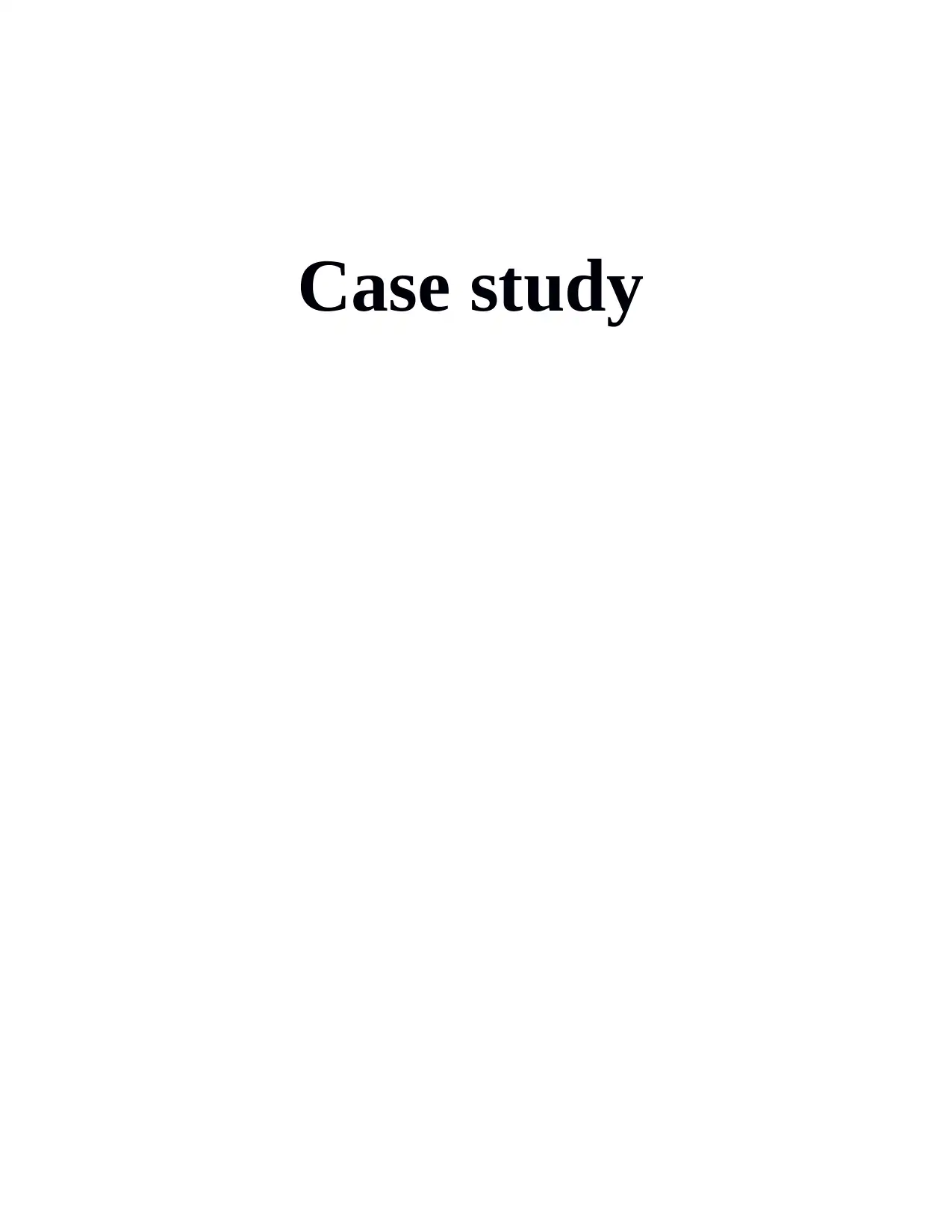
Case study
Paraphrase This Document
Need a fresh take? Get an instant paraphrase of this document with our AI Paraphraser
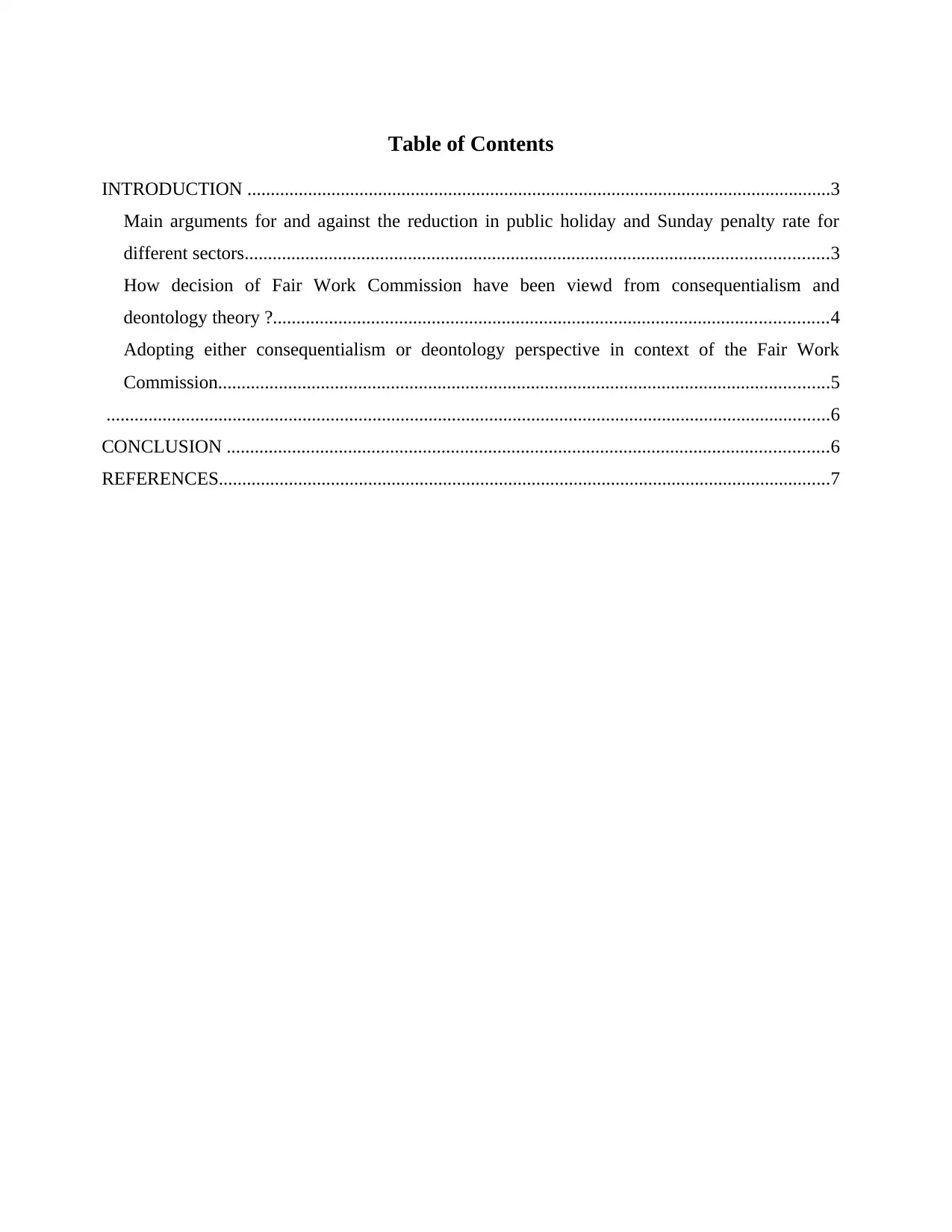
Table of Contents
INTRODUCTION .............................................................................................................................3
Main arguments for and against the reduction in public holiday and Sunday penalty rate for
different sectors.............................................................................................................................3
How decision of Fair Work Commission have been viewd from consequentialism and
deontology theory ?.......................................................................................................................4
Adopting either consequentialism or deontology perspective in context of the Fair Work
Commission...................................................................................................................................5
...........................................................................................................................................................6
CONCLUSION .................................................................................................................................6
REFERENCES...................................................................................................................................7
INTRODUCTION .............................................................................................................................3
Main arguments for and against the reduction in public holiday and Sunday penalty rate for
different sectors.............................................................................................................................3
How decision of Fair Work Commission have been viewd from consequentialism and
deontology theory ?.......................................................................................................................4
Adopting either consequentialism or deontology perspective in context of the Fair Work
Commission...................................................................................................................................5
...........................................................................................................................................................6
CONCLUSION .................................................................................................................................6
REFERENCES...................................................................................................................................7
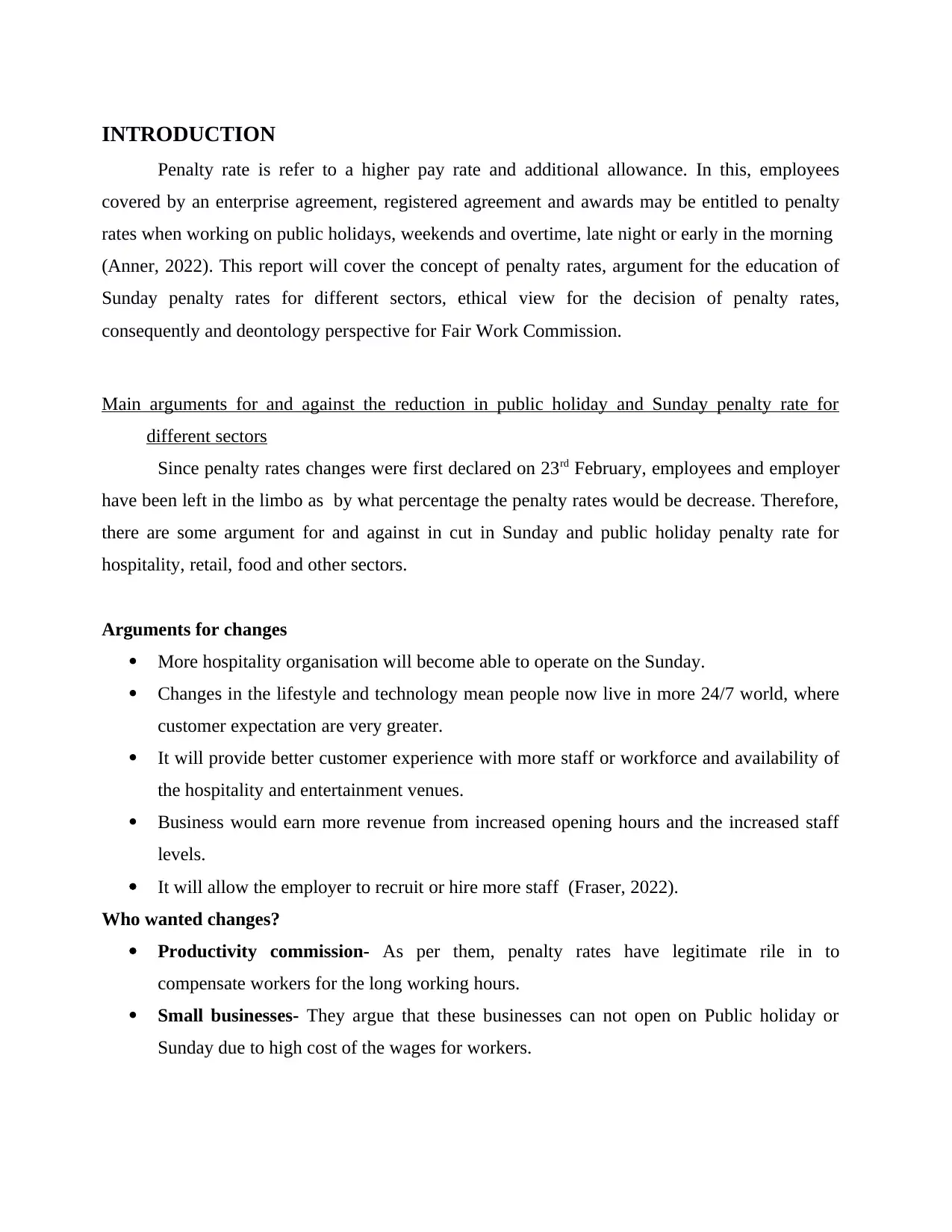
INTRODUCTION
Penalty rate is refer to a higher pay rate and additional allowance. In this, employees
covered by an enterprise agreement, registered agreement and awards may be entitled to penalty
rates when working on public holidays, weekends and overtime, late night or early in the morning
(Anner, 2022). This report will cover the concept of penalty rates, argument for the education of
Sunday penalty rates for different sectors, ethical view for the decision of penalty rates,
consequently and deontology perspective for Fair Work Commission.
Main arguments for and against the reduction in public holiday and Sunday penalty rate for
different sectors
Since penalty rates changes were first declared on 23rd February, employees and employer
have been left in the limbo as by what percentage the penalty rates would be decrease. Therefore,
there are some argument for and against in cut in Sunday and public holiday penalty rate for
hospitality, retail, food and other sectors.
Arguments for changes
More hospitality organisation will become able to operate on the Sunday.
Changes in the lifestyle and technology mean people now live in more 24/7 world, where
customer expectation are very greater.
It will provide better customer experience with more staff or workforce and availability of
the hospitality and entertainment venues.
Business would earn more revenue from increased opening hours and the increased staff
levels.
It will allow the employer to recruit or hire more staff (Fraser, 2022).
Who wanted changes?
Productivity commission- As per them, penalty rates have legitimate rile in to
compensate workers for the long working hours.
Small businesses- They argue that these businesses can not open on Public holiday or
Sunday due to high cost of the wages for workers.
Penalty rate is refer to a higher pay rate and additional allowance. In this, employees
covered by an enterprise agreement, registered agreement and awards may be entitled to penalty
rates when working on public holidays, weekends and overtime, late night or early in the morning
(Anner, 2022). This report will cover the concept of penalty rates, argument for the education of
Sunday penalty rates for different sectors, ethical view for the decision of penalty rates,
consequently and deontology perspective for Fair Work Commission.
Main arguments for and against the reduction in public holiday and Sunday penalty rate for
different sectors
Since penalty rates changes were first declared on 23rd February, employees and employer
have been left in the limbo as by what percentage the penalty rates would be decrease. Therefore,
there are some argument for and against in cut in Sunday and public holiday penalty rate for
hospitality, retail, food and other sectors.
Arguments for changes
More hospitality organisation will become able to operate on the Sunday.
Changes in the lifestyle and technology mean people now live in more 24/7 world, where
customer expectation are very greater.
It will provide better customer experience with more staff or workforce and availability of
the hospitality and entertainment venues.
Business would earn more revenue from increased opening hours and the increased staff
levels.
It will allow the employer to recruit or hire more staff (Fraser, 2022).
Who wanted changes?
Productivity commission- As per them, penalty rates have legitimate rile in to
compensate workers for the long working hours.
Small businesses- They argue that these businesses can not open on Public holiday or
Sunday due to high cost of the wages for workers.
⊘ This is a preview!⊘
Do you want full access?
Subscribe today to unlock all pages.

Trusted by 1+ million students worldwide
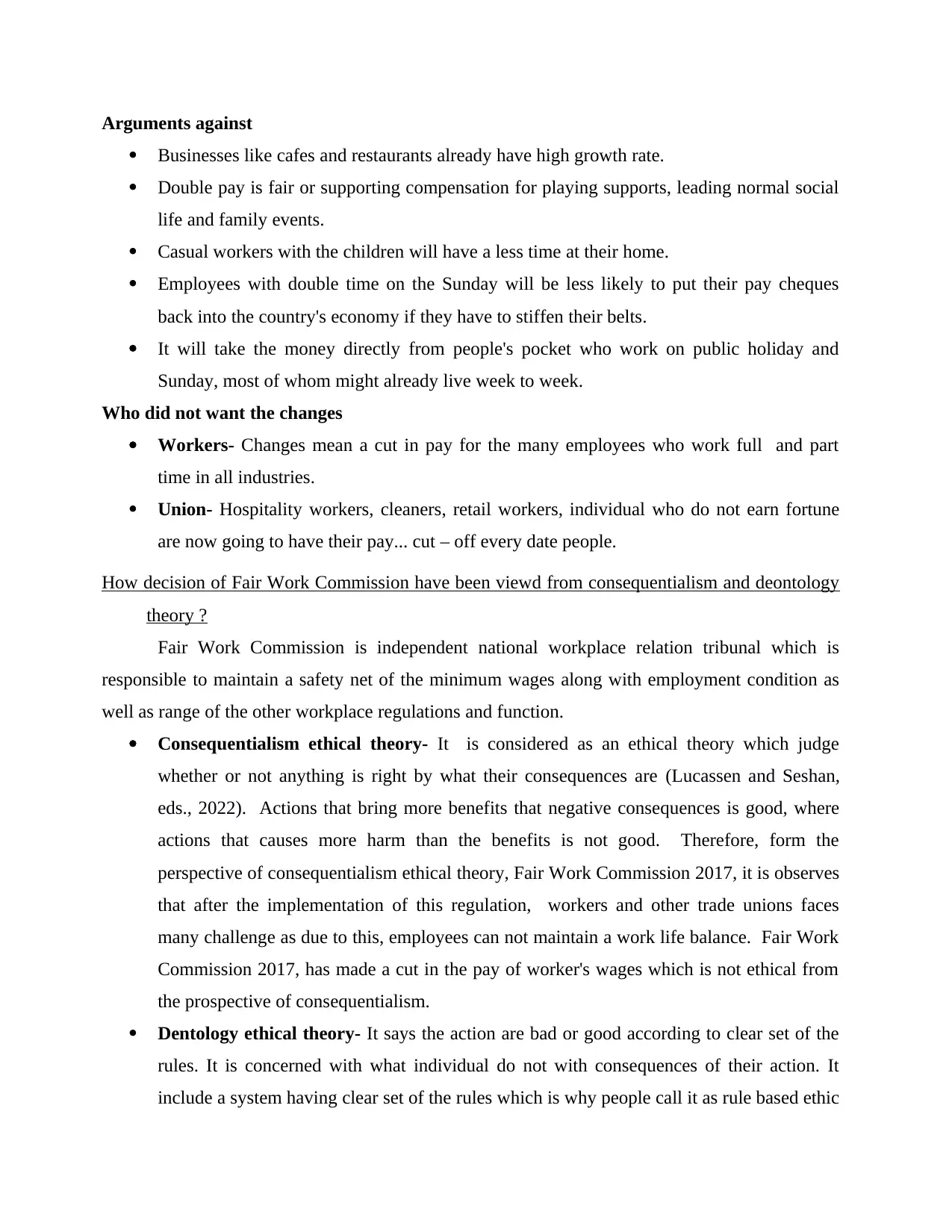
Arguments against
Businesses like cafes and restaurants already have high growth rate.
Double pay is fair or supporting compensation for playing supports, leading normal social
life and family events.
Casual workers with the children will have a less time at their home.
Employees with double time on the Sunday will be less likely to put their pay cheques
back into the country's economy if they have to stiffen their belts.
It will take the money directly from people's pocket who work on public holiday and
Sunday, most of whom might already live week to week.
Who did not want the changes
Workers- Changes mean a cut in pay for the many employees who work full and part
time in all industries.
Union- Hospitality workers, cleaners, retail workers, individual who do not earn fortune
are now going to have their pay... cut – off every date people.
How decision of Fair Work Commission have been viewd from consequentialism and deontology
theory ?
Fair Work Commission is independent national workplace relation tribunal which is
responsible to maintain a safety net of the minimum wages along with employment condition as
well as range of the other workplace regulations and function.
Consequentialism ethical theory- It is considered as an ethical theory which judge
whether or not anything is right by what their consequences are (Lucassen and Seshan,
eds., 2022). Actions that bring more benefits that negative consequences is good, where
actions that causes more harm than the benefits is not good. Therefore, form the
perspective of consequentialism ethical theory, Fair Work Commission 2017, it is observes
that after the implementation of this regulation, workers and other trade unions faces
many challenge as due to this, employees can not maintain a work life balance. Fair Work
Commission 2017, has made a cut in the pay of worker's wages which is not ethical from
the prospective of consequentialism.
Dentology ethical theory- It says the action are bad or good according to clear set of the
rules. It is concerned with what individual do not with consequences of their action. It
include a system having clear set of the rules which is why people call it as rule based ethic
Businesses like cafes and restaurants already have high growth rate.
Double pay is fair or supporting compensation for playing supports, leading normal social
life and family events.
Casual workers with the children will have a less time at their home.
Employees with double time on the Sunday will be less likely to put their pay cheques
back into the country's economy if they have to stiffen their belts.
It will take the money directly from people's pocket who work on public holiday and
Sunday, most of whom might already live week to week.
Who did not want the changes
Workers- Changes mean a cut in pay for the many employees who work full and part
time in all industries.
Union- Hospitality workers, cleaners, retail workers, individual who do not earn fortune
are now going to have their pay... cut – off every date people.
How decision of Fair Work Commission have been viewd from consequentialism and deontology
theory ?
Fair Work Commission is independent national workplace relation tribunal which is
responsible to maintain a safety net of the minimum wages along with employment condition as
well as range of the other workplace regulations and function.
Consequentialism ethical theory- It is considered as an ethical theory which judge
whether or not anything is right by what their consequences are (Lucassen and Seshan,
eds., 2022). Actions that bring more benefits that negative consequences is good, where
actions that causes more harm than the benefits is not good. Therefore, form the
perspective of consequentialism ethical theory, Fair Work Commission 2017, it is observes
that after the implementation of this regulation, workers and other trade unions faces
many challenge as due to this, employees can not maintain a work life balance. Fair Work
Commission 2017, has made a cut in the pay of worker's wages which is not ethical from
the prospective of consequentialism.
Dentology ethical theory- It says the action are bad or good according to clear set of the
rules. It is concerned with what individual do not with consequences of their action. It
include a system having clear set of the rules which is why people call it as rule based ethic
Paraphrase This Document
Need a fresh take? Get an instant paraphrase of this document with our AI Paraphraser
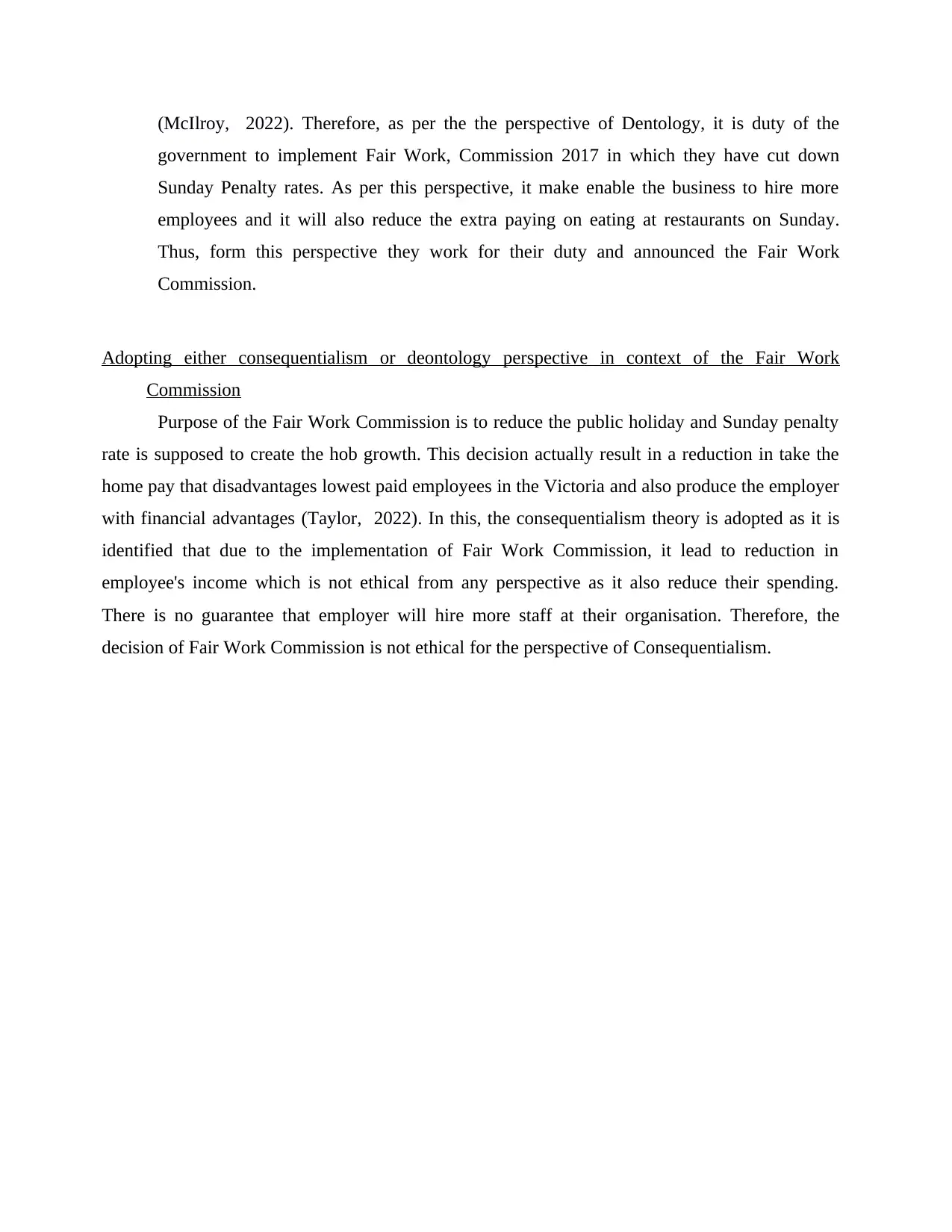
(McIlroy, 2022). Therefore, as per the the perspective of Dentology, it is duty of the
government to implement Fair Work, Commission 2017 in which they have cut down
Sunday Penalty rates. As per this perspective, it make enable the business to hire more
employees and it will also reduce the extra paying on eating at restaurants on Sunday.
Thus, form this perspective they work for their duty and announced the Fair Work
Commission.
Adopting either consequentialism or deontology perspective in context of the Fair Work
Commission
Purpose of the Fair Work Commission is to reduce the public holiday and Sunday penalty
rate is supposed to create the hob growth. This decision actually result in a reduction in take the
home pay that disadvantages lowest paid employees in the Victoria and also produce the employer
with financial advantages (Taylor, 2022). In this, the consequentialism theory is adopted as it is
identified that due to the implementation of Fair Work Commission, it lead to reduction in
employee's income which is not ethical from any perspective as it also reduce their spending.
There is no guarantee that employer will hire more staff at their organisation. Therefore, the
decision of Fair Work Commission is not ethical for the perspective of Consequentialism.
government to implement Fair Work, Commission 2017 in which they have cut down
Sunday Penalty rates. As per this perspective, it make enable the business to hire more
employees and it will also reduce the extra paying on eating at restaurants on Sunday.
Thus, form this perspective they work for their duty and announced the Fair Work
Commission.
Adopting either consequentialism or deontology perspective in context of the Fair Work
Commission
Purpose of the Fair Work Commission is to reduce the public holiday and Sunday penalty
rate is supposed to create the hob growth. This decision actually result in a reduction in take the
home pay that disadvantages lowest paid employees in the Victoria and also produce the employer
with financial advantages (Taylor, 2022). In this, the consequentialism theory is adopted as it is
identified that due to the implementation of Fair Work Commission, it lead to reduction in
employee's income which is not ethical from any perspective as it also reduce their spending.
There is no guarantee that employer will hire more staff at their organisation. Therefore, the
decision of Fair Work Commission is not ethical for the perspective of Consequentialism.
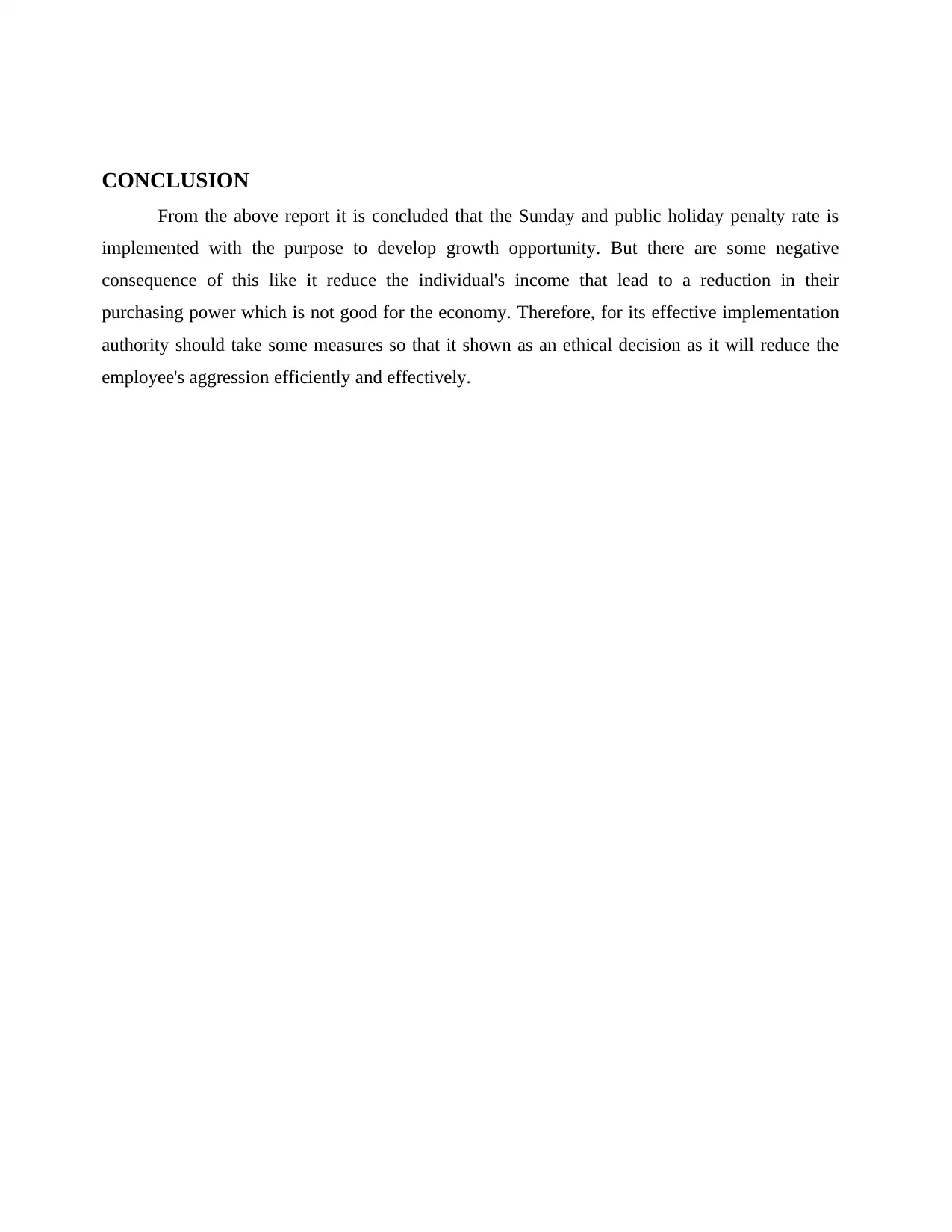
CONCLUSION
From the above report it is concluded that the Sunday and public holiday penalty rate is
implemented with the purpose to develop growth opportunity. But there are some negative
consequence of this like it reduce the individual's income that lead to a reduction in their
purchasing power which is not good for the economy. Therefore, for its effective implementation
authority should take some measures so that it shown as an ethical decision as it will reduce the
employee's aggression efficiently and effectively.
From the above report it is concluded that the Sunday and public holiday penalty rate is
implemented with the purpose to develop growth opportunity. But there are some negative
consequence of this like it reduce the individual's income that lead to a reduction in their
purchasing power which is not good for the economy. Therefore, for its effective implementation
authority should take some measures so that it shown as an ethical decision as it will reduce the
employee's aggression efficiently and effectively.
⊘ This is a preview!⊘
Do you want full access?
Subscribe today to unlock all pages.

Trusted by 1+ million students worldwide
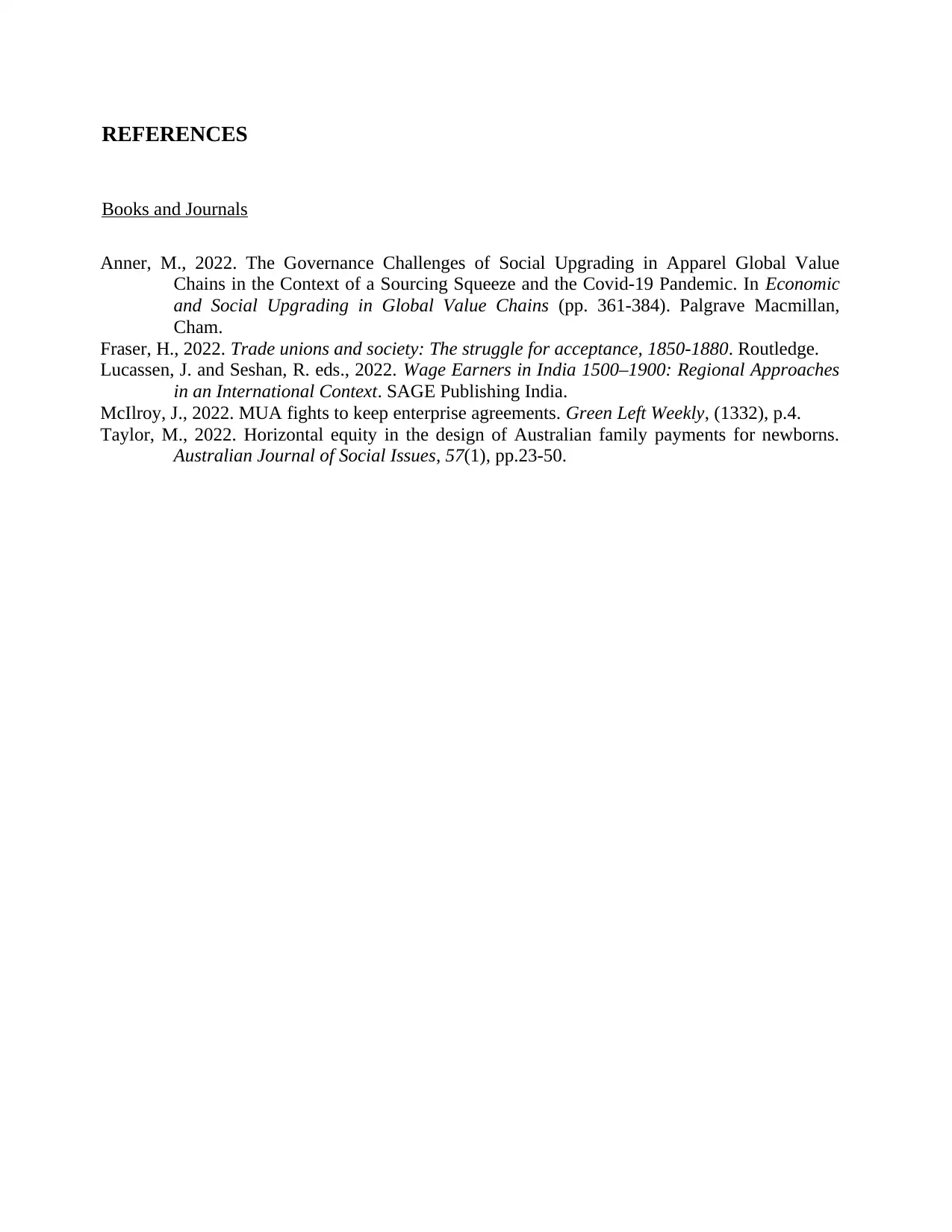
REFERENCES
Books and Journals
Anner, M., 2022. The Governance Challenges of Social Upgrading in Apparel Global Value
Chains in the Context of a Sourcing Squeeze and the Covid-19 Pandemic. In Economic
and Social Upgrading in Global Value Chains (pp. 361-384). Palgrave Macmillan,
Cham.
Fraser, H., 2022. Trade unions and society: The struggle for acceptance, 1850-1880. Routledge.
Lucassen, J. and Seshan, R. eds., 2022. Wage Earners in India 1500–1900: Regional Approaches
in an International Context. SAGE Publishing India.
McIlroy, J., 2022. MUA fights to keep enterprise agreements. Green Left Weekly, (1332), p.4.
Taylor, M., 2022. Horizontal equity in the design of Australian family payments for newborns.
Australian Journal of Social Issues, 57(1), pp.23-50.
Books and Journals
Anner, M., 2022. The Governance Challenges of Social Upgrading in Apparel Global Value
Chains in the Context of a Sourcing Squeeze and the Covid-19 Pandemic. In Economic
and Social Upgrading in Global Value Chains (pp. 361-384). Palgrave Macmillan,
Cham.
Fraser, H., 2022. Trade unions and society: The struggle for acceptance, 1850-1880. Routledge.
Lucassen, J. and Seshan, R. eds., 2022. Wage Earners in India 1500–1900: Regional Approaches
in an International Context. SAGE Publishing India.
McIlroy, J., 2022. MUA fights to keep enterprise agreements. Green Left Weekly, (1332), p.4.
Taylor, M., 2022. Horizontal equity in the design of Australian family payments for newborns.
Australian Journal of Social Issues, 57(1), pp.23-50.
1 out of 7
Related Documents
Your All-in-One AI-Powered Toolkit for Academic Success.
+13062052269
info@desklib.com
Available 24*7 on WhatsApp / Email
![[object Object]](/_next/static/media/star-bottom.7253800d.svg)
Unlock your academic potential
Copyright © 2020–2026 A2Z Services. All Rights Reserved. Developed and managed by ZUCOL.





